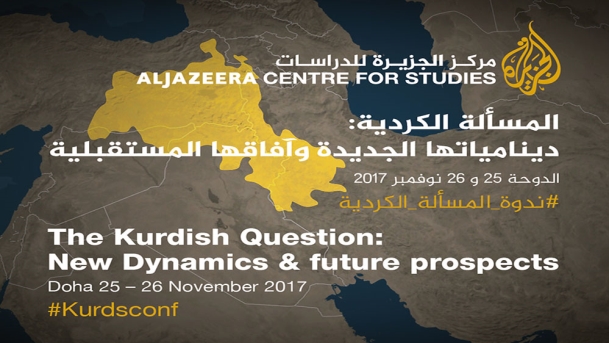
Al Jazeera Centre for Studies (AJCS) is organising a two-day conference in Doha to investigate the Kurdish question with all of its new dynamics and future prospects.
Scheduled to take place on 25-26 November 2017, the conference will shed light on these dynamics by exploring Kurdish history and identifying the current active forces influencing the Kurdish question, whether between the various Kurdish groups or between the Kurds and their respective countries. It will also look into the influences of regional and international players.
Participants in the seminar will also assess the successes and failures of the recent approaches of the concerned countries, namely Iraq, Syria, Turkey and Iran, to the issue.
The growing impact of regional and international players on the Kurdish question will be also examined along with the impact of the recent rise of separatist movements around the world on the Kurdish struggle.
The conference will conclude by exploring the future prospects of the Kurdish question in the context of a very volatile Middle East.
AJCS was among the first to highlight the gravity of the Kurdish question and its dire geopolitical repercussions on the region during the seminar it organised in cooperation with the Iraqi-African Centre for Strategic Studies in January 2013.
The two-day conference examined the driving forces in Iraq, Syria, Turkey and Iran with the participation of researchers, experts, academics and politicians from those countries. Next month’s conference comes four years after to track the developments of the Kurdish questions in the light of the changes sweeping the region and the entire world.
Conference Programme
|
Time |
Session |
|
9:00–10:00 |
Registration
|
|
10:00 – 10:15 |
Opening
|
|
10:15–12:00 |
Session One: The new dynamics of the Kurdish question The Kurdish issue is deep-rooted in the history, geography and demography of the region, especially since the reshaping of the map of the Middle East following the Sykes-Picot agreement a hundred years ago. What makes the Kurdish issue significant is the recent dynamics that have affected most of its components, regardless of their experiences or policies. These dynamics are manifest whether between the various Kurdish groups, between the Kurds and their respective countries (i.e. Iran, Iraq, Syria and Turkey), or in the influences of regional and international players.
Moderator: Basheer Nafi, historian and senior researcher at Al Jazeera Centre for Studies
Speakers:
|
|
12:00–12:30 |
Coffee Break
|
|
12:30–14:30 |
Session Two: Revisiting the existing approaches to the Kurdish question Despite deep and strong bonds that carve the Kurds’ shared identity, the dispersed presence of Kurds across a number of countries within the Middle East and beyond has caused them to adopt courses as many as the countries they reside in. Meanwhile, the dissimilarities among the Kurdish groups in Iraq, Syria, Turkey and Iran are attributed in some way to the demographical, political and ideological differences within the Kurdish groups themselves; differences are also attributed to the approaches of the countries concerned with the issue. This session aims to assess the success and failure of various approaches to and policies toward the Kurdish issue.
Moderator: Mayyadah Mohammad,Presenter at Al Jazeera Arabic
Speakers:
|
|
14:30–15:30 |
Lunch Break
|
|
15:30-17:30 |
Session Three: The growing influences of regional and international players Throughout history, the Kurdish issue has been subject to regional and international influences and has been the centre of regional and international stakes. As a result, support for and the use, if not manipulation, of certain Kurdish groups in the region have been swinging. These influences increase at the time of conflicts that, in most cases, expose the frailty of national entities and regional orders. How do we assess the nature of regional and international interrelations with the Kurds? Which players, from within the region or beyond, have influence on the Kurdish question and can thus affect its realities and attempt to reshape its future whether positively or negatively? These are some of the questions that will be addressed in the third session.
Moderator: Thembisa Fakude,Researcher at Al Jazeera Centre for Studies
Speakers:
|
|
Day Two
|
|
|
09:00-11:00 |
Session Four: The impact of the recent rise of separatist movements around the world on the Kurdish struggle The referendum in Kurdistan took place concurrently with that of Catalonia. While the Kurdistan referendum took place amid regional tensions and successive crises plunging the Middle East into the unknown, that of Catalonia was impacted by other domestic considerations including the limitedness of the liberal democratic model and the dichotomy of nationalism and sweeping globalisation. Regardless of the outcomes of the referenda, both of which having reached a deadlock, the world is now seeing a growing trend of eruption of sub-ethnic groups and separatist movements. This session sheds light on the future of the Kurdish struggle in a comparative context, presenting a number of separatist experiences in other regions, namely Africa and Europe.
Moderator: Abdalkader Faeez,Al Jazeera bureau chief in Tehran
Speakers:
|
|
11:00 – 11:30 |
Coffee Break
|
|
11:30 – 13:30 |
Session Five: The future of the Kurdish question in the context of a volatile Middle East The total rejection of the Kurdistan referendum by many states in the region and worldwide has no doubt been a mark on the Kurds’ journey towards independence. It has signified the end of the journey and the beginning of a new era. However, the crises and conflicts storming the Middle East, which are open to all predictions, will not only bring about more opportunities and challenges, but will also cause the stakeholders to seek new approaches to the Kurdish question. This closing session will address these opportunities and challenges, and forecast the future prospects of the Kurdish issue amid unstable regional conditions.
Moderator: Salah Eddin Elzein,director of Al Jazeera Centre for Studies
Speakers:
|